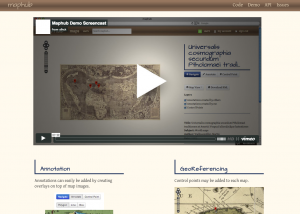
Earlier this year, as part of the DM2E project, we put out a call to humanities academics and technologists to see if they could come up with innovative ideas for small technology projects that would further humanities research by using open content, open data and/or open source.
We’re very pleased to announce that the winners are Dr Bernhard Haslhofer (University of Vienna) and Dr Robyn Adams (Centre for Editing Lives and Letters, University College London). Both winners will receive financial support to help them undertake the work they proposed and will be blogging about the progress of their project. You can follow their progress via the DM2E blog.
####Award 1: Semantic tagging for old maps… and other things
The first Award goes to Dr Bernhard Haslhofer of Vienna University. His project will involve building on an open source web application he has been working on called Maphub.
Dr Haslhofer told us a little bit about the inspiration for his project:
“People love old maps” is a statement that we heard a lot from curators in libraries. This combined with the assumption that many people also have knowledge to share or stories to tell about historical maps, was our motivation to build Maphub.
In essence Maphub is an open source Web application that, first of all, pulls out digitized historical maps from closed environments, adds zooming functionality, and assigns Web URIs so that people can talk about them online. It also supports two main use cases:
(i) georeferencing maps by linking points on the map to Geonames locations;
(ii) commenting on maps or map regions by creating annotations. While users are entering their comments, Maphub analyzes the entered text on the fly and suggests so-called semantic tags, which the user accepts or rejects.
Semantic tags appear like “normal” tags on the user interface, but are in fact links to DBpedia resources. In that way, the user links her annotations and therefore also the underlying historical map with resources from two open data sources. Besides consuming open data during the annotation authoring process, Maphub also contributes collected knowledge back as open data by exposing all annotations following the W3C Open Annotation specification. In that way, Maphub supports people in a loop of using and producing open data in the context of historical maps.
Dr Haslhofer looks forward to seeing how collaborations will blossom between these various web annotation systems:
We believe that people also love other things on the Web and that Web annotation tools should support semantic tagging as well. Therefore, we will make it available as a plugin for Annotorious. Annotorious is a JavaScript image annotation library that can be used in any Website, and is also compatible with the Open Knowledge’s Foundations’s Annotator.
Annotorious and Maphub have common origins and the Open Humanities will support us in unifing parallel development streams into a single, reusable annotation tool that works for digitized maps but also for other media. We will also conduct another user study to inform the design of that function for other application contexts.
####Award 2: Joined Up Early Modern Diplomacy: Linked Data from the Correspondence of Thomas Bodley
The second award goes to Dr Robyn Adams of the Centre for Editing Lives and Letters, University College London. The project will re-purpose the open resource that Dr Adams has been building with a team of others: the Diplomatic Correspondence of Thomas Bodley.
The project will use ‘additional’ information that was encoded into the digitisation of early modern letters that took place at the Centre for Editing Lives and Letters. In the initial incarnation of the project this data which included biographical and geographical information contained within letters was not used (although it was encoded).
Dr Adams told us a little bit about what she plans on doing with the money from the Awards:
With the prize funding from the Open Humanities Awards, we propose to mine the data that was
generated but not fully used in the first phase of the project. This data is a rich source of
biographical and geographical information, the visualization of which evokes
the complex and diverse texture of the late sixteenth-century European
diplomatic and military landscape. Bodley’s position in The Hague as the only
English representative on the Dutch Council of State put him at the centre of a
heterogeneous nexus of correspondents a time long before the Republic of
Letters burgeoned in the subsequent century.
The project will interrogate three data fields within the larger data set of Bodley’s diplomatic
correspondence in order to generate visualizations; the network of correspondents
and recipients, and the people and places mentioned within the letters. These
visualizations will be incorporated into the project website, where they will
enhance and extend the knowledge derived from the existing corpus of
correspondence. The visualizations, which will have scope to be playful while
drawn from scrupulous scholarship, will offer an alternative pathway for
scholars and the interested public to understand that in this period
especially, the political, university and kinship networks were fundamental to
advancement and prosperity.
“In mapping the relational activity between data sets,” Dr Adams went on, “I hope to further illuminate and reanimate Bodley’s position within the Elizabethan compass. Furthermore, I hope to demonstrate that fruitful routes of enquiry can result if scholars commit to going the extra mile to encode and record data in their research that may not have immediate relevance to their own studies.”
We offer our heartiest congratulations to the both Dr Haslhofer and Dr Adams both of whom will be presenting their work at the forthcoming Web as Literature conference at the British Library and this year’s OKCon in Geneva. Follow the progress of the Awards recipients via the DM2E project website.
Sam is a data trainer and wrangler at Open Knowledge. He Tweets from @Noel_Mas











Both projects look fascinating -congrats!